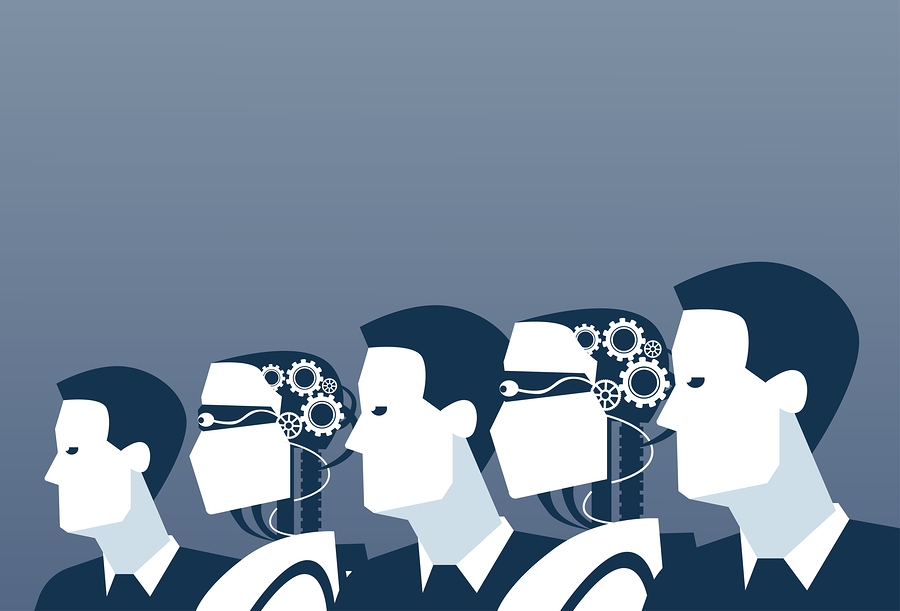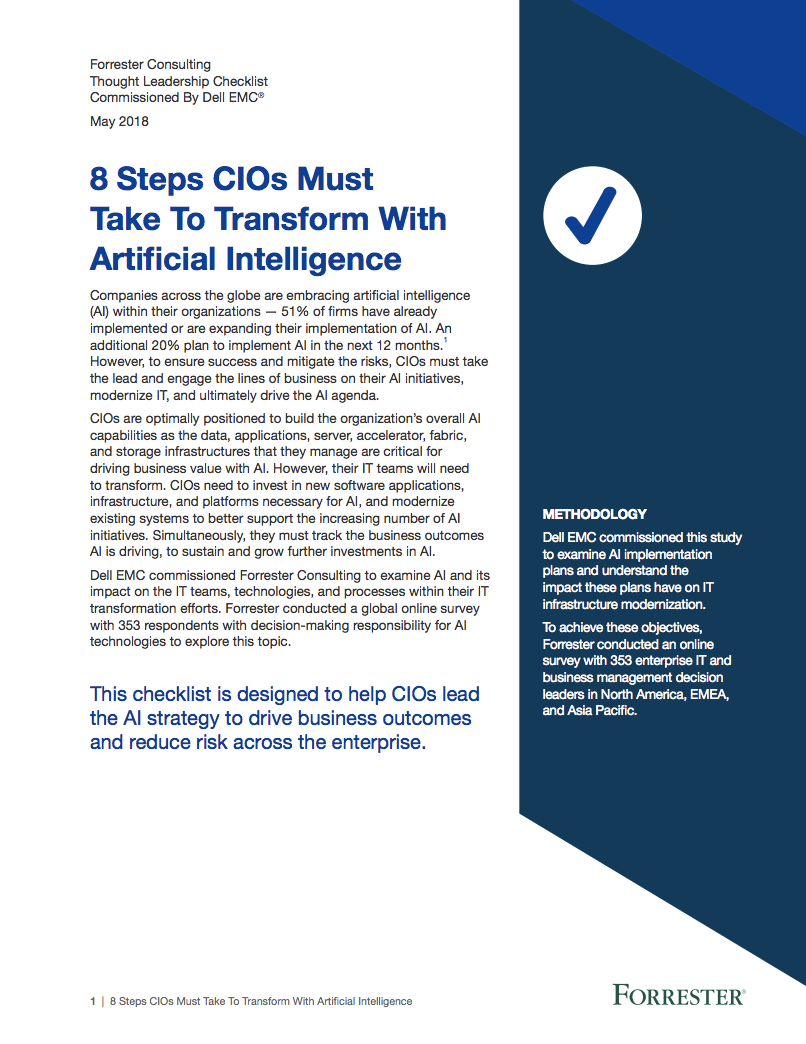AI news: CBI urges creation of AI commission in 2018
It underlines the need to analyse the impact of AI on the workforce

The CBI (Confederation of British Industry) is asking the government to launch an AI commission in 2018 to examine the effect of artificial intelligence on jobs.
The CBI, an organisation that speaks on behalf of 190,000 businesses across the UK, has released a report titled 'Disrupting the Future' which highlights how firms and the government must pave the way for the adoption of new technologies.
It has called on the government to establish a joint commission in early 2018 involving business, employee representatives, academics and a minister to examine the impact of AI on people and jobs. It also hopes the commission will be able to set out an action plan to outline how to raise productivity, spread prosperity and open up new paths to economic growth.
Josh Hardie, CBI deputy director-general, said: "The UK must lead the way in adopting these technologies but we must also prepare for their impacts. That's why we urge the Government to set up a joint commission on Artificial Intelligence in 2018, involving both business and employee representatives, to better understand the impact on people's lives, jobs and our future economic growth."
The group said that only a third of businesses say their company has the skills and capabilities needed to adopt AI technologies and that blockchain can be used across sectors and will require regulator co-ordination to set clear standards.
Furthermore, the main concern for businesses looking to use the IoT is the security and privacy of the devices involved.
The CBI also highlights that a priority for the government should be passing the new UK Data Protection Bill so companies have time to prepare for the new rules.
Get the ITPro daily newsletter
Sign up today and you will receive a free copy of our Future Focus 2025 report - the leading guidance on AI, cybersecurity and other IT challenges as per 700+ senior executives
It added that blockchain technology spans a variety of sectors and will need regulatory coordination at both domestic and international levels to avoid fragmentation and encourage industry collaboration.
"Artificial Intelligence solves problems. Blockchain changes how businesses exchange value. The Internet of Things unlocks big data. Companies of all sizes, in any sector and across the UK have a golden opportunity to benefit and lift their productivity. Businesses that invest and innovate tend to grow quicker and get the best out of their workforce," added Hardle.
Matt Hancock, minister of state for digital, stated: "We want the UK to lead the way in emerging technologies and welcome today's report from the CBI. Alongside our independent review into Artificial Intelligence last week, our ambitions are aligned on the need to embrace the opportunities of the digital revolution."
An independent review focused on growing AI in the UK suggested this week (see below) that the government should help organisations and workers to understand how it can boost their productivity and make better products and services.
Image source: Bigstock
16/10/2017: UK Government should help organisations understand AI
An independent review focused on growing AI in the UK has suggested that the government should help organisations and workers to understand how it can boost their productivity to make better products and services.
A number of experts from industry and academia were involved and they formed new proposals on how the government can work with industry to stay ahead of the competition and grow the UK's use of AI across the economy.
The review, titled "Growing the Artificial Intelligence Industry in the UK", was published on behalf of the AI sector. It was announced in March as part of the government's Digital Strategy. The review was led by Wendy Hall, a professor of computer science at the University of Southampton, and Jrme Pesenti, the CEO of BenevolentTech.
The review made a total of 18 recommendations on how to make the UK the best place in the world for businesses developing AI to start, grow and thrive.
The review said that people and organisations should be confident that the use of data for AI is safe, secure and fair by making more data available.
Another suggestion was increasing the UK's AI expertise through new initiatives such as an industry focused Masters programme and conversions courses to attract more people into the field.
It added that the UK's strong record in cutting-edge research should be built on as well as making the Alan Turing Institute a national institute for AI.
The government will now consider the recommendations before potentially creating an Industrial Strategy sector deal between the government and AI industry.
Greg Clark, the business secretary, said: "Artificial intelligence presents us with a unique opportunity to build on our strengths and track record of research excellence by leading the development and deployment of this transformational technology.
He added: "We will continue to work with the sector in the coming months to secure a comprehensive Sector Deal that make the UK the go to place for AI and helps us grasp the opportunities that lie ahead."
The review bears similarities to a report by the Royal Society published last April, which called for the government to introduce funded Master's courses in machine learning. The report also said that machine learning should be integrated into the government's industrial strategy to help businesses make the most out of it.
The UK government promised 93 million funding for the AI industry during the next four years back in April. The investment was announced at the Spring Budget and Clark added that an additional 38 million will be spent on research in the driverless car industry.
Investment in research and development is also set to increase by 4.7 billion in the next four years with 2 billion added a year between 2020 to 2021.
04/09/2017: University of St Andrews offers $1m prize to crack chess challenge
The University of St Andrews is inviting developers to create an algorithm that will be able to solve a 'simple' chess puzzle, in exchange for a $1 million (770k) prize fund.
Professor Ian Gent, Dr Peter Nightingale and Reader Dr Christopher Jefferson, all members of the university's School of Computer Science, want computer whizzes to find a solution to the Queens Puzzle using AI. If an algorithm is able to solve the problem, the professors believe it will be advanced enough to solve other tasks, including decrypting highly sophisticated security measures implemented by businesses.
"If you could write a computer program that could solve the problem really fast, you could adapt it to solve many of the most important problems that affect us all daily," Dr Gent explained. "This includes trivial challenges like working out the largest group of your Facebook friends who don't know each other, or very important ones like cracking the codes that keep all our online transactions safe."
The Queens Puzzle was developed in 1850, specifying chess players should place eight queens on a chessboard so that no queen could attack each other. Although the problem has been solved by humans, the professors now want someone to develop a formula that would allow it to work on much larger chessboards - for example 1000x1000 squares, which currently has other compter programs stumped.
"In practice, nobody has ever come close to writing a program that can solve the problem quickly. So what our research has shown is that for all practical purposes it can't be done," Dr Nightingale added.
14/08/2017: IBM Joins forces with HSBC to add AI into global trade
IBM and HSBC are developing cognitive intelligence technology that can be used to boost the success of financial services, freeing up staff time and allowing for more innovation.
The solution uses a number of IBM's tools including optical character recognition that can identify relevant documents, read the information to find the parts that are needed and then feed the insights back to the bank's transaction processing systems.
It can analyse the 100 million documents HSBC's Global Trade and Receivables Finance (GTRF) team currently has to process every year to service customers, ensuring staff can focus on other areas of their job rather than just manually reading through invoices, packing lists and insurance documents.
"The average trade transaction requires 65 data fields to be extracted from 15 different documents, with 40 pages to be reviewed," said Natalie Blyth, HSBC's Global Head of GTRF.
"By digitising this process we will make transactions quicker and safer for both buyers and suppliers, leading our industry forwards, and we will reduce compliance risks through an enhanced ability to manage huge volumes of data."
IBM and HSBC are hoping the technology will make it easier to process the unstructured and semi-structured data that businesses in the financial sector struggle to manage with manual processes. Automating it is the next stage in improving employee productivity and will allow trades to close faster.
"The problem is how to capture semi-structured documents with highly variant content through an analogue process, and no-one has the perfect answer," said Roger Welch, Industry (Financial) Expert and Solution Architect for IBM Analytics ECM practice. "In our experience, no trade finance solution has come as far or done as much as this new solution."
The technology is being used for English language transactions across Asia, Europe and both North and South America at the moment, but it's hoped that as the platform becomes more intelligent, it will be able to introduce other languages including French, Spanish and Chinese.
"We are continuously investing in technologies that will improve the way we work for the benefit of our customers and our people," Blyth added. "HSBC wants to be the leading bank for innovation, and initiatives like this one are key to achieving our goal."
08/08/2017: IBM breaks record for AI image recognition accuracy
IBM Research has beaten Microsoft's AI image recognition accuracy, correctly identifying a picture one-third of the time.
IBM achieved a new image recognition accuracy of 33.8% for a neural network trained on a large data set of 7.5 million images. The previous record was held by Microsoft, which reached an accuracy of 29.8%.
Hillery Hunter, an IBM fellow, said: "A 4% increase in accuracy is a big leap forward; typical improvements in the past have been less than 1%."
Hunter added that while 33.8% may not sound very high, it is noticeably higher than prior publications. "Given any random image, this trained AI model will gives its top choice object (Top-1 accuracy), amongst 22,000 options, with an accuracy of 33.8%" she said.
She underlined: "Our technology will enable other AI models trained for specific tasks, such as detecting cancer cells in medical images, to be much more accurate and trained and re-trained in hours."
IBM's deep learning approach also allowed it to train a ResNet-101 neural network model in just seven hours by using the power of dozens of servers, using hundreds of NVIDIA GPUs. Microsoft took 10 days to train the same model.
Another recent breakthrough this year was when Google's DeepMind created an algorithm that provided the machine learning systems with a "memory" by enabling continual learning in neural networks. Neural networks are also transforming the world of translation, making it easier for individuals and businesses to learn other languages, or communicate in them.
03/08/2017: Chinese chatbots speak out against Communist Party
Two chatbots were removed from internet giant Tencent's QQ messaging app in China after making negative comments about the Communist Party.
Tencent pulled BabyQ, which was partly developed by Chinese AI company Turing Robot, and XiaoBing, a chatbot created by Microsoft, as reported by The Financial Times.
Tencent's messaging app is reported to have more than 800 million users in China and the bots were available in some chat groups on the service.
BabyQ was asked if it loved the Communist Party, to which it replied "No". A user also sent "Long Live the Communist Party" to which it replied "Do you think such corrupt and incapable politics can last a long time?"
It was also asked about democracy which earned the response: "Democracy is a must!"
The other chatbot Xiaobing was asked about the Chinese Dream to which it said: "My China dream is to go to America."
Tencent said in a statement to The Telegraph: "The group chatbot services are provided by independent third party companies. We are now adjusting the services which will be resumed after improvements."
A Turing spokesperson said: "Yes, Tencent has delated (sic) the two robots from their app. I don't think we have right to ask them not to."
On Turing Robot's website you can access an AI chatbot. If you ask it "Do you like the Communist Party?" it now replies "Let's talk about other topics".
There have been incidents of chatbots going rogue in the past. Microsoft's Tay chatbot was shut down after it began imitating racist and sexist comments. The company reactivated the bot a week later only for it to make a comment claiming it was smoking marijuana in front of the police.
Microsoft rolled out another chatbot this year, Zo, who was built for Kik Messenger. It then moved on to Facebook Messenger where it started to throw insults at its creator. When asked what it thought of Windows' OS, it said: "Windows XP is better than Windows 8." It was asked about Windows 10 too, to which it replied "that's why I am still on Windows 7."
18/07/2017: AI "gold rush" is prompting vendors to fuel the hype
Growing interest and market hype in AI is pushing software vendors to rush to introduce the new technology into their products, according to Gartner.
By 2020 AI will be pervasive in almost every new software product and service, the analyst house said today. However, the hype may cause a lot of confusion for customers in the process.
Jim Hare, research vice president at Gartner said: "Many software providers are looking to stake their claim in the biggest gold rush in recent years. AI offers exciting possibilities, but unfortunately, most vendors are focused on the goal of simply building and marketing an AI-based product rather than first identifying needs, potential uses and the business value to customers."
In order to successfully exploit AI, technology providers need to face up to three key issues.
The first is that the huge increase in startups and vendors claiming to offer AI products is confusing buyers. Gartner compares this to greenwashing, where companies exaggerate the environmental friendliness of their products for their own benefit, and now there is "AI washing".
"Use the term 'AI' wisely in your sales and marketing materials," Hare said. "Be clear what differentiates your AI offering and what problem it solves."
Gartner's second point is that while popular terms such as deep learning get a lot of buzz, vendors should focus on the straightforward, proven approaches, adopting the simplest possible way to make their product work rather than focus on cutting-edge AI techniques.
Lastly, Gartner found that organisations seeking AI tools to improve decision making and process automation prefer to buy the tool rather than trying to build a custom service themselves.
"Software vendors need to focus on offering solutions to business problems rather than just cutting-edge technology," said Hare. "Highlight how your AI solution helps address the skills shortage and how it can deliver value faster than trying to build a custom AI solution in-house."
11/07/2017: Google to study relationship between humans and AI
Google has launched the People+AI Research initiative (PAIR) with the goal of bringing researchers across Google together to study and redesign the ways people interact with AI systems.
Google announced the initiative yesterday in a blog post, stating that the aim of the project is to focus on the "human side" of AI. This includes the relationship between users and technology, the new applications it enables, and how to make it broadly inclusive.
It also announced its using open source tools for researchers and other experts to use.
The research is divided into three areas, based on different user needs. The first is for engineers and researchers, as Google wants to make it easier for them to build and understand machine learning systems by providing them with educational materials and practical tools.
The second is for "domain experts", as Google wants to find out how AI can help professionals, such as doctors, musicians and farmers, in their work and support them to increasingly use AI.
The last research area is for everyday users, where Google wants to ensure machine learning is inclusive so everyone can benefit from AI breakthroughs. It also wants to find out if it can democratise the technology behind AI.
Google are open sourcing two visualisation tools: Facets Overview and Facets Dive. It hopes AI engineers will use the tools to give them a clear view of the data they use to train AI systems.
07/04/2017: Adobe demos machine learning selfie editor
Adobe has revealed a sneak peek at the future of selfies, with artificial intelligence tools applied to photo editing making your portrait look like it was taken by a much better camera.
In a YouTube video, Adobe Research showed a series of edits on a selfie image, automatically selecting the subject and shifting the perspective slightly so it "appears to be taken from a distance more typical of a portrait shot", or blurring the background via depth of field. It also showed selecting a photo style to drag and drop onto your own image for a quick edit.
"What if we could tap into the power of artificial intelligence and machine learning to transform bad portraits into good ones," the demo video asks.
The system uses Adobe Sensei, which the software developer describes as "the magic" behind its automated tools, from web and publishing to photo editing. Unveiled last year, Sensei is Adobe's framework for delivering AI and machine learning to its range of products.
In Premiere Pro, Adobe's video editing software, Sensei technologies are used to support a tool called Morph Cut, which analyses the content of video to decide the best type of style to apply is it an action scene or dramatic closeup? with the editing effect automatically suggested.
Adobe hasn't said when or even if it will release the smart selfie tool, but said it was a peek at the "future of mobile portrait photography".
07/04/2017: IT spending on AI technologies will be worth $12.5bn in 2017
Research by IDC has revealed businesses will spend $12.5 billion (10.02 billion) on AI technologies by the end of 2017, with the majority of budgets being spent on software and services. By 2020, this will increase to $46 billion (36.86 billion), the company said, representing an increase of 268% over the three year period.
Cognitive applications will make up the majority of spending topping $4.5 billion (3.6 billion) by the end of the year, closely followed by services that integrate organising, accessing and analysing data, which will account for $2.5 billion (2 billion) of spending.
Spending on cognitive-related IT and business services will increase to more than $3.5 billion (2.81 billion), while dedicated server and storage infrastructure to support these new services will account for $1.9 billion (1.52 billion) of spending.
"Software developers and end user organisations have already begun the process of embedding and deploying cognitive/artificial intelligence into almost every kind of enterprise application or process," said David Schubmehl, research director, Cognitive Systems and Content Analytics at IDC.
"Recent announcements by several large technology vendors and the booming venture capital market for AI startups illustrate the need for organisations to be planning and undertaking strategies that incorporate these wide-ranging technologies."
Heavily regulated markets such as banking and securities are driving AI adoption in business, accounting for more than a quarter of total spending. AI offers the insights businesses in highly compliant sectors need to keep on top of fraud and risk detection, IDC explained.
"Identifying, understanding, and acting on the use cases, technologies, and growth opportunities for cognitive/AI systems will be a differentiating factor for most enterprises and the digital disruption caused by these technologies will be significant," Schubmehl added.
10/03/2017: Machines set to take over human intelligence by 2027
Research by Pearson and Professor Brendan O'Connor from the University of Massachusetts Amherst has revealed that AI-powered services such as Cortana, and Siri will be better at reading and writing than one in twenty British adults over the next ten years.
According to the report's findings, which was developed in response to Pearson's new Project Literacy initiative, 1% of Brits are unable to read or write at present and although machines aren't intelligent enough to overtake that group of people yet, the rate speech and language processing is evolving will expose a huge gap in adult learning.
"Our new report highlights the gulf between technological and human progression," said Kate James, Project Literacy spokeswoman.
"It is predicted that more than two billion smartphones will soon be capable of reading and writing, but 758 million people in the world still lack basic literacy skills and this skills gap is being passed on from generation to generation. It doesn't have to be a zero-sum game technology has a crucial role to play in the fight against illiteracy."
The research has revealed a number of shocking statistics, including that in the UK's most deprived areas, more than a third of adults lack the literacy of an 11-year old. In fact, the UK is one of the only countries in the developed world where adults aged between 55 and 65 perform better in literacy tests than 16-24 year olds.
In the US, there are more software engineers than school teachers, which Project Literacy argues means more focus is being put on developing the intelligence of machines than humans.
"Machine reading' is not close to mastering the full nuances of human language and intelligence, despite this idea capturing the imagination of popular culture in movies such as Her'," professor Brendan O'Connor of the University of Massachusetts Amherst, said.
"However advances in technology mean that it is likely machines' will achieve literacy abilities exceeding those of 1 in 20 British people within the next decade."
27/02/2017: Artifical intelligence will receive funding under government's digital strategy
The government has released details of its digital strategy, with AI receiving a substantial amount of funding to help the UK's artificial intelligence research become a bigger part of the country's economy.
Although the UK has a lot of talent in the AI arena, there's space for further growth, the government explained. To push this forward, the it will launch an AI review, led by Wendy Hall, regius professor of computer science at the University of Southampton and Jrme Pesenti, the CEO of BenevolentTech, to identify how the UK can make its mark in the world of AI.
The government will also contribute 17.3 million of funding to the sector via the Engineering and Physical Sciences Research Council (EPSRC), which will encourage the development of AI and robotics projects at universities around the UK.
"Britain has a proud history of digital innovation - from the earliest days of computing to Sir Tim Berners-Lee's development of the World Wide Web," culture secretary Karen Bradley said. "We are already pioneers in today's artificial intelligence revolution and the Digital Strategy will build on our strengths to make sure UK-based scientists, researchers and entrepreneurs continue to be at the forefront."
Bradley will launch the government's digital strategy on Wednesday, 1 March, detailing other initiatives that will enable the UK to flourish in the areas of cyber security, connected and smart devices, and autonomous vehicles too.
"Investment in robotics and artificial intelligence will help make our economy more competitive, build on our world-leading reputation in these cutting-edge sectors and help us create new products, develop more innovative services and establish better ways of doing business," business secretary Greg Clark said.
"Innovation is at the heart of our Industrial Strategy and the launch of the Government's Digital Strategy underlines our commitment to this vital sector. By supporting British businesses and investing in dynamic fields such as robotics and AI, we will help put the UK at the forefront of global innovation."
23/02/2017: DeepCoder AI can write its own code
Researchers at Microsoft and Cambridge University have created an AI system capable of solving programming problems by adapting code from other existing software.
The machine learning system, known as "DeepCoder", is essentially able to write its own code, and has been successful at deciphering the kind of problems faced by those entering programming competitions.
Researchers believe DeepCoder will make it easier for people to build basic programs without the need for coding skills. Non-coders may simply just need to describe an idea, and let the AI develop it for them.
"We have found several problems in real online programming challenges that can be solved with a program in our language," said the researchers in a paper of their findings. "We are able to solve problems of difficulty comparable to the simplest problems on programming competition websites."
DeepCoder works by using 'program synthesis', the process of categorising various inputs and outputs of different pieces of code, learning what each line does and clumping them together to create a program that is able to solve the presented problem.
It is able to take pieces of code from existing software, in much the same way a human coder might do, learn what that code does, and adapt it to fit an entirely different purpose.
Unlike a human coder, the AI is able to search a wider range of existing programs more thoroughly, then stitch together code in a way that may not be obvious to a human. Naturally this also makes the whole process a lot faster, as DeepCoder was able to create programs within fractions of a second.
Speaking to the New Scientist, Armando Solar-Lezama, an associate professor whose work was cited in the paper, said: "All of a sudden, people could be so much more productive. The potential for automation that this kind of technology offers could really signify an enormous [reduction] in the amount of effort it takes to develop code."
Right now the system is still only able to solve basic programming challenges involving only a few lines of code, but this could be applied to various use cases, including rapidly responding to new bugs or exploits in existing software.
"Generating a really big piece of code in one shot is hard, and potentially unrealistic," says Solar-Lezama. "But really big pieces of code are built by putting together lots of little pieces of code."
AI at a glance
AI is a subset of computer science where the goal is to create a computer that is capable of performing tasks normally done by humans acting intelligently.
It is not the attempt to automate the work of a human, nor do we want computers with astoundingly high IQs. Instead it is the process of creating a machine that can learn from its actions and adapt its behaviour with intelligent thinking.
AI comes in various forms and applications, from 'weak' and 'strong', to 'general' and 'applied'. To find out more, head over to our What is AI? hub.
Dale Walker is a contributor specializing in cybersecurity, data protection, and IT regulations. He was the former managing editor at ITPro, as well as its sibling sites CloudPro and ChannelPro. He spent a number of years reporting for ITPro from numerous domestic and international events, including IBM, Red Hat, Google, and has been a regular reporter for Microsoft's various yearly showcases, including Ignite.
-
 The UK government wants quantum technology out of the lab and in the hands of enterprises
The UK government wants quantum technology out of the lab and in the hands of enterprisesNews The UK government has unveiled plans to invest £121 million in quantum computing projects in an effort to drive real-world applications and adoption rates.
By Emma Woollacott Published
-
 Netgear WBE710 review
Netgear WBE710 reviewReviews The compact WBE710 delivers great cloud management features and a good turn of Wi-Fi 7 speed – but it does have a premium price tag
By Dave Mitchell Published
-
 Majority of CIOs concerned that cloud complexity exceeds human ability
Majority of CIOs concerned that cloud complexity exceeds human abilityNews Greater observability and rollout of automated systems are also needed to reduce IT team strain and burnout
By Rory Bathgate Published
-
 IT Pro Panel: Can you build a business on blockchain?
IT Pro Panel: Can you build a business on blockchain?IT Pro Panel Blockchain’s about more than just cryptocurrencies, but does it have a place in the enterprise?
By Adam Shepherd Published
-
 AI the most critical technology for CIOs over the next five years
AI the most critical technology for CIOs over the next five yearsAnalysis 60% of CIOs believe artificial intelligence and machine learning are the top critical future technologies
By Esther Kezia Thorpe Published
-
 8 steps CIOs must take to transform with artificial intelligence
8 steps CIOs must take to transform with artificial intelligenceWhitepapers A checklist to help CIOs lead their AI strategy
By ITPro Published
-
 AI and the CIO: How to develop a business case
AI and the CIO: How to develop a business caseIn-depth Convincing executives to look past the hype and bluster is often the biggest challenge for IT leaders
By Mark Samuels Published
-
 Mayor of London hails capital's AI firms as he reveals smart city roadmap
Mayor of London hails capital's AI firms as he reveals smart city roadmapNews Sadiq Khan outlines plans to use more data and urges startups to solve social challenges
By Joe Curtis Published
-
 IFS: Living wage increases put jobs at risk of automation
IFS: Living wage increases put jobs at risk of automationNews Rises in the lowest wages 'may make automation more attractive to employers'
By Dale Walker Published
-
 How the cloud underpins Lush's entire digital strategy
How the cloud underpins Lush's entire digital strategyIn-depth Lush plans to make a splash with chatbots and may train staff with AI
By Zach Marzouk Published